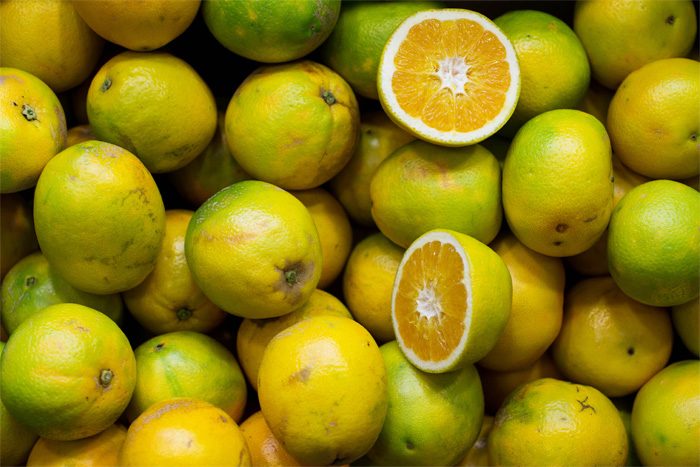
Written By: Beth Ehrensberger, RD
Title: Registered Dietitian
Alumni: University of Tennessee, Knoxville
Last Updated on:

Everyday fruits like bananas, apples, oranges and grapes may not have the same exotic pedigree as pomegranates and carambola, but that doesn’t mean they lack nutritional power! With the bounty of summer produce nearing its end, perhaps it’s time to reintroduce your taste buds to everyday fruits that pack a surprising and forgotten amount of respectable nutrition!
Table of Contents
What could be better than potent nutrition in a no-prep-required package? Not-so-boring bananas make a great fruit choice since they are loaded with minerals like potassium, which is important for heart, skeletal and muscle function. Research suggests a correlation between a diet low in potassium and high blood pressure, as well as an increased risk for stroke. A medium banana contains about 420 mg of potassium, and is one of the top ten food sources in the American diet for this mineral, according to the Continuing Survey of Food Intakes by Individuals, 1994-96. Even better, banana benefits don’t stop at potassium; you’ll also be getting a healthy dose of Vitamin B6, which helps improve immune function and protein metabolism.
Everyday Fruit Tips: Bananas are perfect sliced and mixed with oatmeal. For a quick, kid-friendly meal, spread a whole grain hotdog bun with peanut butter, and fill the bun with a whole, peeled banana.

So just how is it that apples have gotten the reputation for keeping the doctor away? It’s likely due in part to the high antioxidant capacity that apples boast. Several studies have correlated eating apples with reduced risk of some cancers, heart disease, asthma, and diabetes. And the doctor isn’t all that an apple can help keep away: it can help keep the pounds away, too. A 2003 study suggested that three apples a day could help aid weight loss efforts.
Everyday Fruit Tips: Core an apple and fill with raisins, then baste with apple juice and bake until tender; your plain apple becomes a spectacular, fiber-filled desert! Also, apples and protein can make a delicious duo for a long-lasting snack: just slice tart apples thinly and add to a peanut butter or turkey sandwich, or pair with an ounce of sharp cheddar.
You’ll discover much more than Vitamin C when you peel into an orange, though just one tangy fruit can fulfill your daily requirement. Oranges are bursting with benefits, like a healthy dose of phytonutrients – some of which have been suggested to reduce inflammation, as well as cholesterol and blood pressure. And like apples, oranges are a dieter’s delight, since they have a low glycemic index and are high in soluble fiber, which slows down the rapid rise in blood sugar and helps tame hunger.
Everyday Fruit Tips: Mix orange sections into a green salad for unexpected sweetness and variety. For a satisfying snack, mix chopped oranges with low-fat vanilla yogurt and a sprinkle of heart-healthy nuts like almonds or walnuts.
You’ve probably heard the claims about the health benefits of grape-derived foods like wine and grape juice, but what does the grape itself have to offer? While most research suggests that the strongest antioxidant impact comes from concentrated sources like grape juice and wine, grapes are still great. Whatever variety you choose, grapes supply your diet with manganese, Vitamin B6 and potassium. Best of all, because they require no more prep than washing, a handful of grapes make it easier to sneak more servings of produce into your day.
Everyday Fruit Tips: Frozen grapes make a cool treat perfect for surviving the last dog-days of summer. Thread grapes on a wooden kebab with other fruits for an impressive guest-worthy dessert. Also, grapes make a great snack served with whole grain crackers and string cheese.
Don’t overlook everyday fruits like bananas, apples, oranges, and grapes. While fancy fruits are fun and undoubtedly nutritious, everyday fruits are tops for great year-round value, availability, and flavor.
Alumni: University of Tennessee, Knoxville – Beth Sumrell Ehrensberger is a Registered Dietitian and holds a Master Degree in Public Health. An experienced nutrition counselor, writer and public speaker, Beth specializes in translating complex nutrition information into practical concepts. Beth was awarded a Nutrition Communications Fellowship to the National Cancer Institute, and has worked on the internationally recognized Nutrition Action Healthletter of the Center for Science in the Public Interest.
antioxidant, apples, bananas, citrus, fruits, grapes, oranges